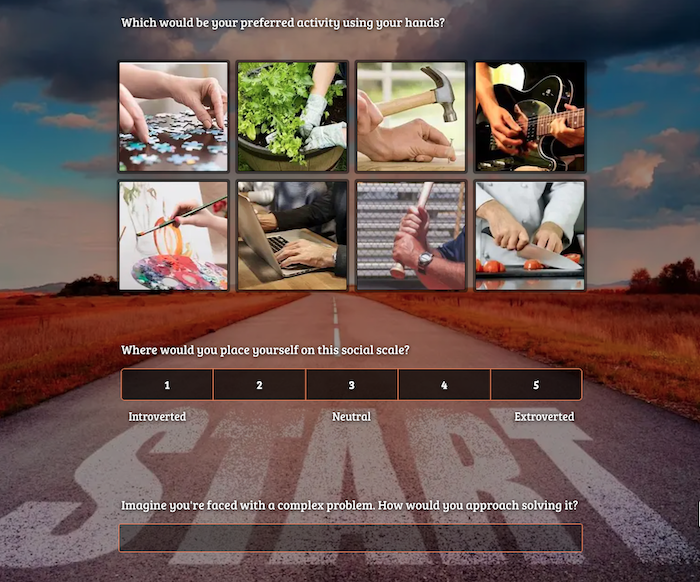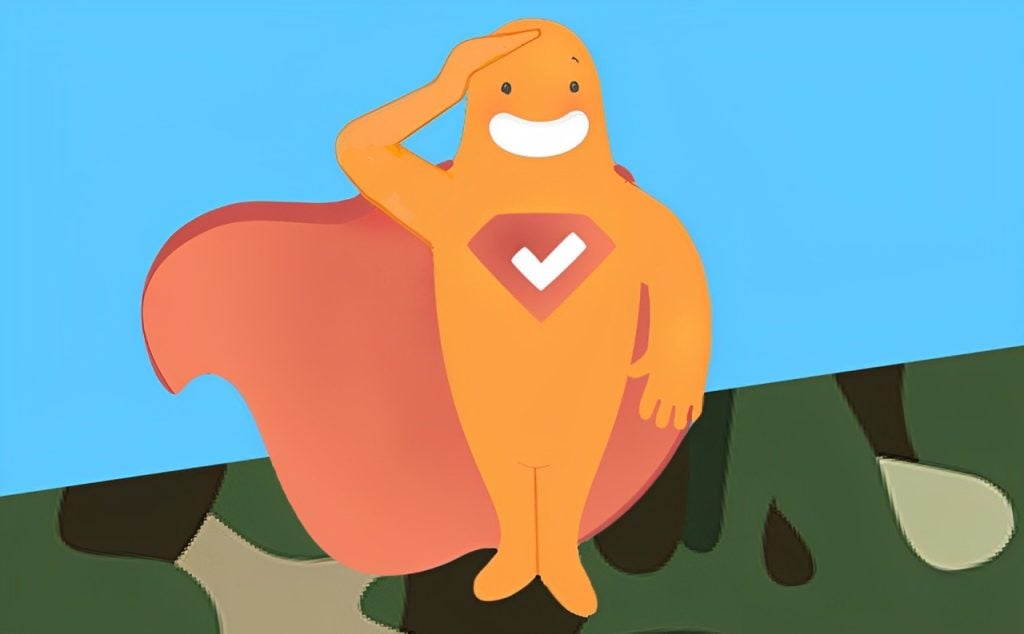“What do you want to be when you grow up?” It’s a question every child is asked at some point in their lives, but childhood dreams don’t often turn into adult realities. Perhaps that’s why, later in life, many adults also look to make a career change. Whether you’re aiming to help a young adult find their career path or helping a seasoned adult find a new one, a career survey is a great tool for helping individuals make informed decisions about their future.
Create your FREE career survey, form, or poll now!
What is a Career Survey?
A career survey or career test, similar to a skills and aptitude test, is a tool or assessment designed to help individuals evaluate their interests, skills, strengths, values, and preferences in order to make informed decisions about their career paths. It provides insights into career options that align with an individual’s personal characteristics and aspirations. Career surveys can be valuable for students, professionals seeking a career change, or anyone looking to explore their career options.
7 Types of Career Surveys
There are several types of career surveys. Here is a look at some of the most popular methods of career testing.
1. Interest-Based Surveys
This type of career path test assesses an individual’s interests and passions, helping them identify careers that match. Examples include the Strong Interest Inventory and the Holland Code.
2. Personality-Based Surveys
These surveys evaluate an individual’s personality traits and tendencies to suggest careers that align with their personality type. The Myers-Briggs Type Indicator (MBTI) is a well-known personality-based assessment. Read more about the MBTI and other personality surveys in our blog.
3. Skills and Strengths Assessment
This type of survey helps individuals identify their core skills, strengths, and weaknesses. The results can guide them toward careers that play off of their strengths rather than their weaknesses.
4. Values and Motivation Surveys
These assessments look at an individual’s values, beliefs, and what motivates them. This information can be used to identify careers that align with their core values and provide a greater sense of fulfillment versus simply “punching a clock.”
5. Career Aptitude Tests
A career aptitude test measures an individual’s natural aptitude or potential for different types of work or tasks. They can help uncover areas where someone might excel or enjoy working even if the career had not previously been on their radar.
6. Career Exploration Surveys
These surveys provide a broader overview of various career options and industries. The surveys typically include questions about job roles, responsibilities, work environments, and necessary qualifications.
7. Self-Assessment Tools
Sometimes it’s beneficial to let the individual assess themselves, rather than trying to make the assessment for them. Self-assessment tools allow individuals to reflect on their experiences, achievements, and goals, helping them clarify their aspirations and how they want to shape their careers.
7 People or Organizations That Use Career Surveys
Career surveys are used by a variety of individuals and groups, including:
- Students: Career testing in school or university helps high school and college students explore potential career paths before making decisions about majors or future studies.
- Job Seekers: Professionals looking for a career change or new job use these surveys to assess their transferable skills and identify fields that align with their interests.
- Career Counselors: Professionals in the field of career counseling or guidance use these tools to assist their clients in making informed decisions about their careers.
- Human Resources: HR departments of companies may use career surveys as part of their employee development and talent management strategies. These surveys can also help determine if a candidate is the right fit for the job and the company culture, or identify a different role that may be right for them rather than the one they applied for.
- Educational Institutions: Schools and universities use career surveys to provide students with guidance on potential career paths and to inform curriculum decisions.
- Military: The military will sometimes use career aptitude tests to place members within ranks or to help former military members transitioning back to civilian life make a good career choice.
- Government: The Office of Unemployment, for example, may also use career surveys to help individuals struggling to find work identify other employment options based on their skills, strengths, and experience.
Types of Career Survey Questions
Career surveys typically include a variety of questions that aim to gather information about an individual’s interests, skills, values, personality traits, and preferences. The specific questions can vary depending on the type of career survey and the goals of the assessment. Here are some common types of questions you might find on a career survey:
Interest-Based Questions
- What types of activities do you enjoy doing in your free time?
- Which subjects or topics are you most interested in?
- Do you prefer working with numbers, words, or things?
Personality-Based Questions
- Are you more introverted or extroverted?
- How do you handle stressful situations?
- Do you prefer routine tasks or variety in your work?
Skills and Strengths Questions
- What are your strongest skills (e.g., communication, problem-solving, leadership)?
- Which tasks or activities do you excel at?
- What are some accomplishments you’re proud of?
Values and Motivation Questions
- What values are most important to you in a job (e.g., creativity, stability, helping others)?
- What kind of impact do you want to make through your work?
- What work environments or cultures do you thrive in?
Career Aptitude Questions
- Do you enjoy working with your hands, analyzing data, or managing people?
- Are you more drawn to technical tasks or creative tasks?
- Do you prefer problem-solving or customer interaction?
Career Exploration Questions
- What industries or fields interest you the most?
- Are you comfortable working independently or do you prefer teamwork?
- Are you willing to relocate for your job?
Self-Assessment Questions
- What do you see as your strengths and weaknesses?
- What are your short-term and long-term career goals?
- How do you envision your ideal workday?
Scenario-Based Questions
- Imagine you’re faced with a complex problem. How would you approach solving it?
- You have to work on a team project with diverse members. How would you contribute?
- Your friends are in a heated argument. Do you try to moderate, calm them down, step away, or just watch the sparks fly?
As you can see, these questions are designed to help individuals reflect on their preferences, aspirations, characteristics, motivations, and behaviors. The survey’s outcomes, whether in the form of career suggestions or insights, provide individuals with a starting point for further exploration and decision-making. Keep in mind that the variety and complexity of questions can vary based on the specific survey and its intended purpose.
Pros and Cons of Career Surveys
Career surveys offer many benefits as well as several drawbacks. Here are some of the advantages and disadvantages of using career surveys.
Benefits of Career Surveys
- Structured Exploration. Career surveys provide a structured way for individuals to reflect on their interests, strengths, and preferences. This can be very helpful for those who feel overwhelmed by the many career choices available to them.
- Self-Discovery. Career testing helps individuals gain insights into their own personalities, values, and motivations. This self-awareness can be valuable for making informed career decisions that align with one’s “authentic self.”
- Focused Direction. Surveys can narrow down potential career options, giving individuals a clearer direction to pursue. This can save time and effort that might otherwise be spent exploring paths that aren’t the best fit.
- Validation. Surveys can validate individuals’ inclinations and aspirations, boosting their confidence in their chosen career path.
- Clarity for Decision-Making. The results of a career survey can offer a starting point for further research and exploration, making it easier to make smart decisions about education, training, and job searches.
- Guidance for Career Changers. For those considering a career change, surveys can help identify skills and strengths that are transferable to new fields, making the transition smoother.
Career Survey Challenges
- Simplification. Career surveys often simplify complex aspects of an individual’s personality and preferences. People are not one-dimensional, so relying solely on career path test results may overlook important nuances.
- Limited Scope. Surveys might not cover all potential career options or industries, potentially leading individuals to overlook opportunities that fall outside the survey’s scope.
- Subjective Responses. Responses to surveys can be influenced by a person’s mood, current circumstances, or how they perceive themselves in that moment, which might not reflect their long-term preferences accurately. Additionally, a person may be so enamored with a particular career that they answer in a way that they think will lead to that result, even if the answers don’t truly line up with their skills, personality, or motivations.
- Overemphasis on Results. Individuals might place too much emphasis on the survey results without considering other factors like market demand, job availability, or potential for growth.
- Lack of Context. Surveys often lack the context necessary to understand the practicalities and challenges of a particular career. Factors like job responsibilities, work environment, and industry trends might not be adequately addressed.
- Changing Preferences. People’s interests and preferences can evolve over time. What seems appealing today might not be the same in the future. This is typically not an issue with later-stage career changers, but can pose a problem with young adults, who can be very fickle, changing their mind or their behavior and motivations frequently. Additionally, young adults have more time to acquire the skills they want, so they should not always be pigeon-holed based on the skills they have at the moment.
- Not a Substitute for Expert Guidance. While surveys are helpful tools, they shouldn’t replace personalized career counseling, mentorship, or in-depth research.
Career Survey Example
Want to create a career test online? Here’s a look at a career quiz or survey created using the free online survey maker SurveyLegend. As you can see, SurveyLegend allows you to ask a number of types of questions – multiple choice questions, rating questions, opinion scales, and image-based questions to name a few – which helps improve participant engagement leading to more truthful outcomes, a key advantage when it comes to career surveys.

Conclusion
Career surveys can be valuable tools for self-discovery and providing initial direction. They offer a snapshot of an individual’s attributes and preferences and provide suggestions and recommendations based on the individual’s responses. Career surveys can also help narrow down the overwhelming array of career options and provide a starting point for further exploration. Lastly, they can also boost confidence by confirming that the chosen path aligns with the individual’s natural inclinations and strengths. Ready to create your free online career survey or career test? SurveyLegend has you covered!
Have you taken a career survey in the past? Did it help guide you to your current career? If not, what could have improved the survey? Let us know in the comments!
Create your FREE career survey, form, or poll now!
Frequently Asked Questions (FAQs)
Career surveys are a great starting point to help people find their vocation in life, or to find a new one later in life. However, working with a career counselor or mentor in addition to engaging in career testing will provide more insight and guidance.
Career tests aren’t perfect as they can oversimplify people’s complex personalities and preferences. In addition, while tests may determine results based on current skills, an individual can always learn new skills if they have a career goal in mind. Finally, a person’s answers can be influenced by their particular mood or current circumstances – or their desire to achieve a particular outcome – which can lead to inaccurate results. That said, career surveys are a starting point in an individual’s career path journey, and are even more helpful when used in conjunction with a career counselor or mentor.
Career surveys or aptitude tests may be used by students, job changers, educational institutions, career counselors, and company human resources departments, as well as military and government entities.




